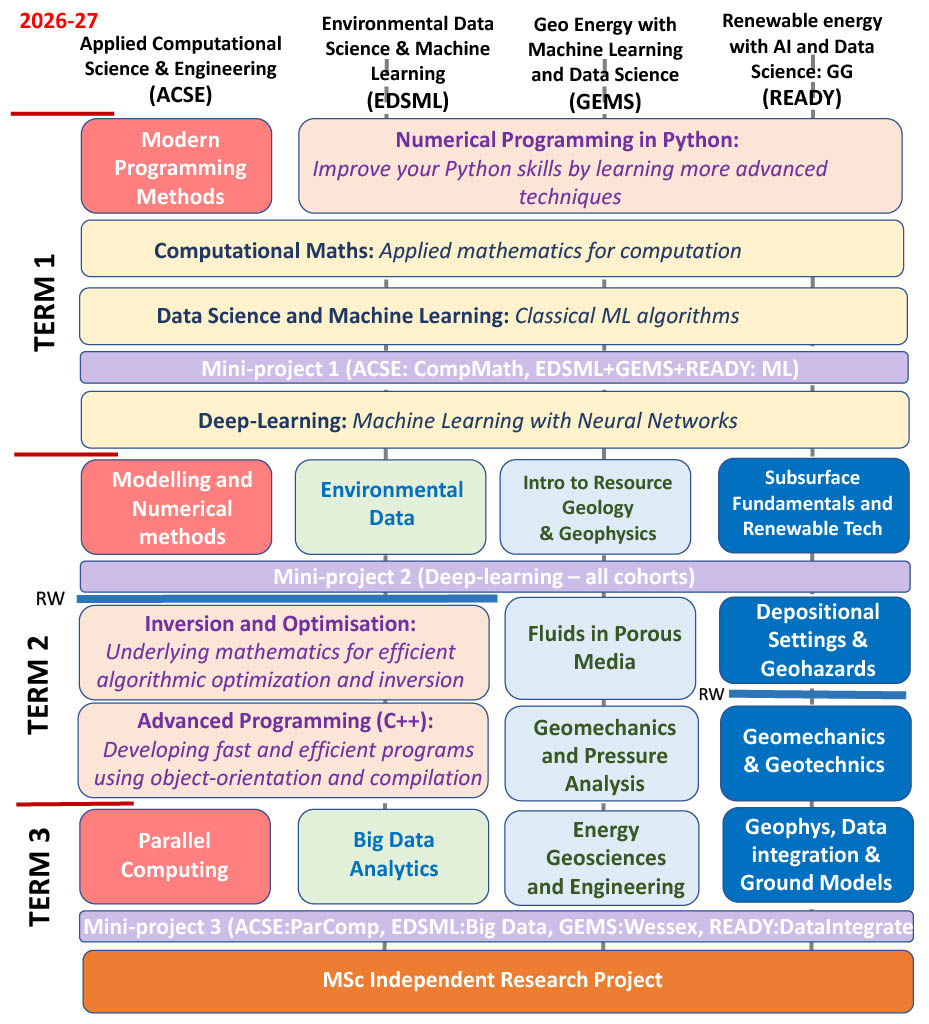Key Information
We strive to increase and broaden inclusivity and support everyone, regardless of background, in breaking down any barriers to your application the Department.
If you are unable to pay a course’s application fee, we encourage you to apply for a fee waiver. If you are interested in this MSc and wish to apply for a fee waiver, please contact adalovelace-admissions@imperial.ac.uk prior to starting your application.
Develop analytical skills in subsurface geoscience and engineering
 Join this 12-month Master’s in Geo-Energy with Machine Learning and Data Science, launched in 2022.
Join this 12-month Master’s in Geo-Energy with Machine Learning and Data Science, launched in 2022.
In preparation for the energy transition, you will study subsurface geoscience and engineering, with a focus on data science and machine learning. You will develop skills that can be applied to carbon dioxide storage, water management, hydrocarbon recovery, geothermal energy and other subsurface processes.
The programme will strengthen your understanding of numerical, analytical and computational concepts, and is taught by experts in these areas.
The course is aimed at geoscientists and engineers who want to acquire advanced computational, data science, machine learning and numerical skills relevant to working on various aspects of the energy transition.
 “Our Master’s in Geo-Energy with Machine Learning and Data Science will equip you with the cutting-edge skills you need to tackle real-world issues facing the global energy sector,” says course director Professor Martin Blunt. “Now more than ever, geoscientists need to gain and apply expertise in Machine Learning and Data Science to problems in subsurface geoscience and engineering.”
“Our Master’s in Geo-Energy with Machine Learning and Data Science will equip you with the cutting-edge skills you need to tackle real-world issues facing the global energy sector,” says course director Professor Martin Blunt. “Now more than ever, geoscientists need to gain and apply expertise in Machine Learning and Data Science to problems in subsurface geoscience and engineering.”
Who is the course for?
The MSc in Geo-Energy with Machine Learning and Data Science is suitable for science and engineering graduates, including students with:
- a mathematics or physical sciences background who want to specialise in subsurface geoscience and engineering, or
- a geoscience and engineering background who want to learn about data science and machine learning as tools for problem solving and analysis, or
- a computer science background who wish to expand their knowledge of ML and observational techniques in the context of subsurface energy and storage.
Students are expected to have basic skills in coding and mathematics. There is a coding course in Python provided before the course formally starts to allow you to refresh and develop your coding skills.
Why should I apply?
The Geo-Energy with Machine Learning and Data Science MSc is unique in combining data science and programming with the fundamentals of geo-energy. It draws on expertise in geo-energy, petroleum geoscience, and petroleum engineering (research and teaching), and you will be taught by Faculty experts in subsurface geoscience and engineering, data science, computational methods and machine learning.
Online information session for MSc GEMS – Tuesday 13 January 2026
Register to attend an online information session about the MSc in Geo-Energy with Machine Learning and Data Science with course director Professor Martin Blunt and teaching fellow Dr Parastoo Salah.
Accordion widget GEMS
The Geo-Energy with Machine Learning and Data Science MSc programme is one of three computational programmes in ESE. The study programme consists of eight taught modules, three mini projects, and one individual research project. It shares teaching modules with our two other computational MSc courses, as shown in the table below.
You will study the following taught courses:
- Numerical programming in Python
- Computational Math
- Data Science and Machine Learning
- Resource Geology and Geophysics
- Fluids and Flow in Porous Media
- Geomechanics and Pressure Analysis
- Applied Energy Geosciences and Engineering
- Deep-Learning
You can see the teaching schedule represented visually below. If you would like an accessible version of this information, please contact ESE webmaster.

Graduates of this course will go on to work in academia, or go on to work in:
- large data and computer companies including start-ups,
- consultancies offering services to the energy industry and working on natural geo-hazards,
- the energy industry, including oil, gas and renewables,
- companies involved in carbon dioxide, hydrogen and/or thermal energy storage,
- engineering companies involved in the energy transition.
How to apply
Inclusivity
We strive to increase and broaden inclusivity and support everyone, regardless of background, in breaking down any barriers to your application the Department. If you are unable to pay a course’s application fee, we encourage you to apply for a fee waiver. If you are interested in this MSc and wish to apply for a fee waiver, please contact adalovelace-admissions@imperial.ac.uk prior to starting your application.
Your application
We select students on the basis of your academic background, experience, references and personal statement.
You will need to provide the names of two suitable referees. One must be an academic reference, the second referee may be another academic referee, or where appropriate/relevant, a professional referee.
Please use your personal statement to describe why you are interested in this course and to highlight your experience that may not be evident elsewhere in the application. Ensure you speak with your academic referees and ask them to prepare a reference.
Please note that even if you don’t have prior experience in all of the areas above, but think your background and skills are a good fit for the programme and are excited about developing your skills in data science and machine learning with a strong focus on the energy transition, please don’t hesitate to contact the course administrator to find out more and discuss.
Study at Imperial
Find out more about postgraduate study at Imperial College London, including tuition fees, scholarships, admissions and how to apply.
Contact
Course director: Professor Martin Blunt, Email Professor Blunt
Admissions: adalovelace-admissions@imperial.ac.uk
Department of Earth Science and Engineering
Imperial College London